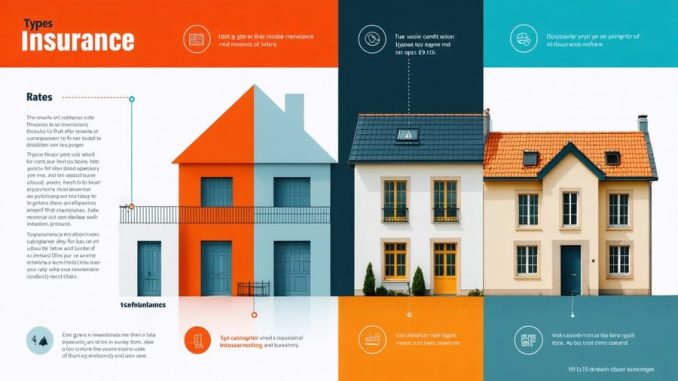
Home renovations can breathe new life into a property, enhancing its comfort, functionality, and aesthetic appeal. Yet, beyond the joy of creating your dream space, it’s important to recognize that these changes can also influence your home insurance rates. Many homeowners overlook how even seemingly minor upgrades or modifications might impact their insurance premiums, sometimes resulting in unexpected adjustments to their coverage costs. Understanding the connection between renovations and insurance is key to managing your finances effectively while protecting your investment.
When you undertake home renovations, you are essentially altering the value and risk profile of your property. Insurance companies calculate premiums based on a variety of factors, including the replacement cost of the home, the materials used, and the likelihood of certain hazards. For example, upgrading your kitchen with high-end appliances and custom cabinetry can significantly increase the overall replacement cost. As the value of your home rises, insurers often adjust premiums to reflect the higher cost they would incur if they needed to cover a claim. In this way, renovations that increase the quality and expense of your home can lead to higher insurance rates—not because the risk is necessarily greater, but because the financial exposure for the insurer has increased.
On the other hand, some renovations may actually help reduce your insurance premiums by mitigating risks. Installing modern fire safety systems, such as smoke detectors, fire sprinklers, or updated electrical wiring, can lower the chances of fire damage, which insurers see as a positive development. Similarly, upgrading your roofing materials to more fire-resistant or impact-resistant options can reduce the risk of damage from storms or hail. Insurance companies appreciate these preventative measures and often reward homeowners with discounts or lower rates. These investments not only protect your home but also demonstrate to insurers that you are proactively managing potential risks, which benefits everyone involved.
However, certain types of renovations can increase your insurance risk and thus your premiums, even if they enhance your home’s functionality. Adding a swimming pool, for instance, introduces potential liability risks. Pools are associated with a higher chance of accidents and injuries, which can lead to costly claims. As a result, insurers may raise premiums or require you to purchase additional liability coverage to safeguard against possible lawsuits. Similarly, creating living spaces in basements or attics can affect the risk of water damage or structural issues, prompting insurers to reconsider the terms or cost of your policy. In these cases, it’s not just the replacement value but also the liability exposure and potential for damage that influence insurance rates.
Another factor to consider is the impact of renovations on your home’s compliance with local building codes and safety regulations. Older homes often have outdated electrical systems, plumbing, or structural elements that can be red flags for insurers. When you renovate and bring these features up to code, you not only improve safety but also enhance insurability. Insurers typically view homes that meet or exceed current standards as less risky and may offer more favorable premium rates. Conversely, renovations that do not meet code requirements or are done without permits might complicate insurance claims or lead to policy cancellations, underscoring the importance of professional workmanship and adherence to regulations.
It’s also worth noting that renovations can affect your deductible—the amount you pay out of pocket before insurance coverage kicks in. Some upgrades, especially those related to security or disaster preparedness, might qualify you for deductible reductions. For example, installing a home security system or storm shutters could lower your deductible, making it easier and more affordable to handle smaller claims. These subtle financial benefits often go unnoticed but can add significant value over time by reducing your overall cost of ownership.
Communication with your insurance provider is crucial whenever you plan to make renovations. Failing to inform your insurer about major changes can lead to coverage gaps or claim denials if damage occurs. For instance, if you renovate your home extensively but do not update your insurance policy to reflect the increased value, you might find that your coverage limits are insufficient to fully repair or replace your home after a loss. On the other hand, proactively notifying your insurer allows them to reassess your risk and adjust your policy appropriately, keeping your coverage aligned with the current state of your home.
Consider the example of a homeowner who decides to finish their basement, transforming it from a simple storage area into a fully equipped entertainment room with expensive electronics and furniture. This renovation not only raises the replacement cost but also changes the nature of the property’s risk, such as increasing the chance of water damage or theft. Without updating their insurance, the homeowner might be underinsured, facing substantial out-of-pocket expenses if a claim arises. By contrast, informing the insurer and adjusting the policy helps ensure adequate protection and avoids unpleasant surprises.
In summary, home renovations have a meaningful impact on insurance rates because they alter both the value and risk profile of your property. Whether you are upgrading your kitchen, adding a swimming pool, or installing advanced safety features, these changes can affect premiums in different ways. Taking the time to understand this relationship and maintaining open communication with your insurer is essential. It allows you to enjoy the benefits of your home improvements while safeguarding your financial security. In the end, a well-planned renovation paired with the right insurance coverage creates a harmonious balance between enhancing your living space and protecting your investment—ensuring peace of mind for years to come.